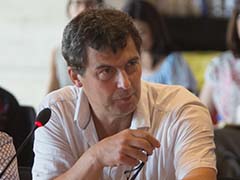Urban spaces, besides being public, are also political. They start out from the idea that all members of the public have access to it, but who has access to certain “public” spaces and who does not?
Eric Fassin is a lecturer in Sociology at the Paris 8 University – Vincennes-Saint Dennis and a researcher at the Laboratoire d’études de genre et de sexualité (CNRS – Paris 8). He was interviewed by Shared Spaces during his visit to the CCCB where, on 2 July, he gave a lecture titled “Governance and the Rise of Populism in Southern Europe” in the series “Europe: From Hope to Disaffection”, organised by the CCCB and the British Academy.
The renovation of the Place de la République and the ways in which citizens now use the space have considerably reduced the space given to cars. For Fassin, this is a good example of the fact that, besides being public, such spaces are also political. Public space starts out from the idea that all members of the public have access to it, but who has access to certain “public” spaces and who does not? In the definition of public space, exclusion is equally as important as inclusion. Public space is political precisely because it defines who can stay in and who is left out.
Fassin also recalls issues we overlook when we understand public space only from a material standpoint. In recent years, social networks have been singled out as the source of the rise of resentment and agressivity. However, online platforms have also made it possible for many people, who otherwise would not have been included, to participate in public debate. He mentions the wave of feminist protests with the #MeToo hashtag as an example of the significance of having the chance to speak without the need for public recognition, thanks to the social networks.



